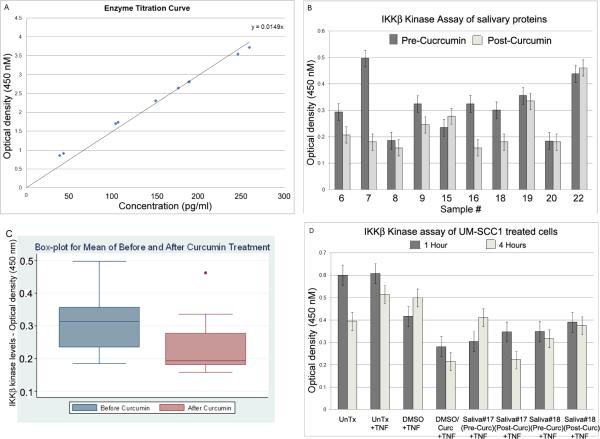Figure 1.
Curcumin inhibits salivary cell IKKβ kinase activity of head and neck cancer patients. A, Dose dependent curve of IKKβ kinase activity was achieved using five IKKβ protein concentrations in increments of 50 pg/mL. The enzyme activity is linear up to 250 pg/mL tested in the present assay. B, Protein was extracted from salivary samples collected from patients with HNSCC before and after a 1-hour curcumin treatment. IKKβ kinase activity was measured using the IKKβ Kinase Assay Kit. Six of 10 samples show a decrease in IKKβ kinase activity, with three samples (#7, #16 and #18) indicating a 50% reduction post curcumin treatment. C, Boxplot showing expression level of IKKβ enzyme activity in pre and post curcumin salivary samples. The results indicate a statistically significant inhibition of IKKβ kinase activity by curcumin with a p value of <0.05. D, The UM-SCC1 cell line was treated with DMSO, curcumin dissolved in DMSO, or saliva samples collected pre and post curcumin treatment. The cells were also pretreated with TNF-α for 15 minutes. As reported earlier11, addition of curcumin inhibits IKKβ kinase activity of UM-SCC1 cells. One of the two post curcumin salivary samples (sample # 17) exhibits an inhibitory effect on IKKβ kinase activity, indicating usefulness of this methodology to determine IKKβ kinase levels in the saliva of HNSCC patients. The IKKβ kinase assay performed at four hours in untreated samples (UnTx) shows a reduction in comparison to 1 hour due to loss of growth factors. The 1 hour treatment of UN-SCC1 cells with pre curcumin saliva:medium (50%:50%) shows reduced IKKβ kinase activity in comparison to untreated controls due to the presence of half the level of growth factors in this mixed medium.

